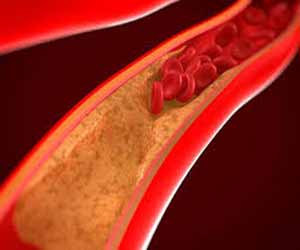- Home
- Editorial
- News
- Practice Guidelines
- Anesthesiology Guidelines
- Cancer Guidelines
- Cardiac Sciences Guidelines
- Critical Care Guidelines
- Dentistry Guidelines
- Dermatology Guidelines
- Diabetes and Endo Guidelines
- Diagnostics Guidelines
- ENT Guidelines
- Featured Practice Guidelines
- Gastroenterology Guidelines
- Geriatrics Guidelines
- Medicine Guidelines
- Nephrology Guidelines
- Neurosciences Guidelines
- Obs and Gynae Guidelines
- Ophthalmology Guidelines
- Orthopaedics Guidelines
- Paediatrics Guidelines
- Psychiatry Guidelines
- Pulmonology Guidelines
- Radiology Guidelines
- Surgery Guidelines
- Urology Guidelines
Scientists clear another obstacle in creating transplant arteries, study suggests

Washington DC [USA]: Scientists are working towards a dream of creating artery banks, similar to blood banks common today with readily available material to replace diseased arteries during surgery.
A study on the same was published in the journal 'Stem Cell Reports'.
The research highlights a better way to grow smooth muscle cells, one of the two cellular building blocks of arteries, from pluripotent stem cells. The work also identifies a potential drug for reducing post-surgical risks in patients who undergo bypass surgery.
"We decided to focus on blood vessels because cardiovascular disease is a major cause of death worldwide," says the Thomson Lab. "In the US for example, heart disease and stroke are the No 1 killers, respectively. And this work also has implications beyond making vessels for transplantation; it's sort of a stepping stone to more advanced tissue engineering," Thomson added.
Producing arteries in the lab require two essential cell types: endothelial cells and smooth muscle cells. In 2017, the lab demonstrated methods to generate and characterise endothelial cells, while the new research focuses on the smooth muscle cells.
Jue Zhang, the lead author of the research, says that widely used growth factors for producing smooth muscle cells from stem cells can also cause intimal hyperplasia, one of the most common reasons a bypass graft fails.
In intimal hyperplasia, a portion of the arterial wall thickens due to proliferation and migration of smooth muscle cells and causes a narrowing of the blood vessel.
"We wanted to have a protocol that can reduce the risk of intimal hyperplasia," Zhang says. "It's a common problem in smooth muscle cell differentiation, and if you want to make a useful artery, you don't want that risk."
Healthy smooth muscle cells need the ability to contract, which helps them distribute blood throughout the body and regulate blood pressure. Using a high throughput screen, the team identified a small molecule, known as RepSox, which had the best potential to produce cells with contractile properties.
The characteristics that make RepSox good for differentiating smooth muscle cells also make it a desirable drug candidate to reduce the risk of post-surgery complications, like intimal hyperplasia. Thus, this stem cell-based high throughput screen can be used as a novel strategy for identifying drugs to restrict the narrowing of blood vessels.
"Even after you have bypass surgery, you can have some problems with your artery, like restenosis (narrowing arteries) due to intimal hyperplasia," says Zhang.
"Currently there are only two FDA-approved drugs on the market to address these problems, and they're not cell-type specific, meaning they have side effects. We found that RepSox inhibits intimal hyperplasia and has fewer side effects," he added.
While this finding brings scientists closer to improving treatments for cardiovascular disease, Zhang says there's still another challenge to address: cell maturity.
"Basically this cell type is better than previous efforts, but it's still not mature yet. We need to induce these cells to become more mature, to be more similar to our native artery, to make it more functional," said Zhang.

Disclaimer: This site is primarily intended for healthcare professionals. Any content/information on this website does not replace the advice of medical and/or health professionals and should not be construed as medical/diagnostic advice/endorsement or prescription. Use of this site is subject to our terms of use, privacy policy, advertisement policy. © 2020 Minerva Medical Treatment Pvt Ltd